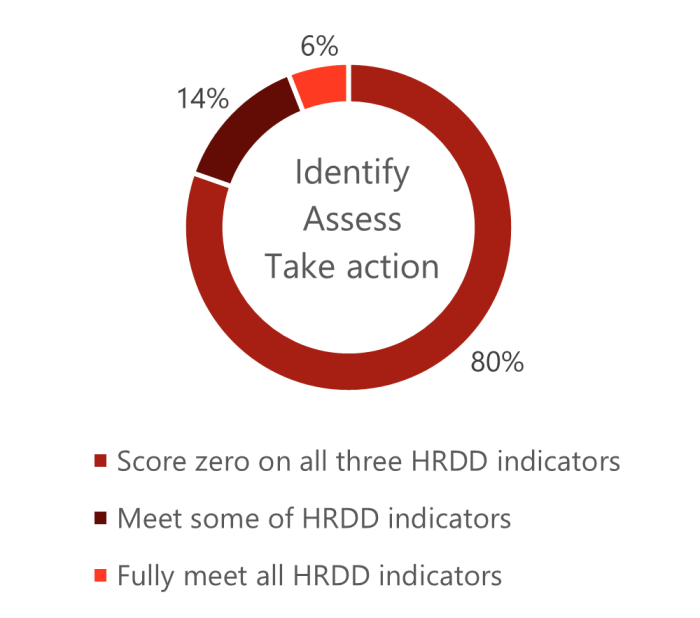Key finding
80% of companies fail on human rights due diligence – regulations, guidance and pressure are needed to accelerate change
The United Nations Guiding Principles on Business and Human Rights establish clear expectations for businesses to prevent and address negative human rights impacts that they cause, contribute to or are directly linked to through their activities or business relationships. A crucial method to ensure corporate respect for human rights outlined by the UNGPs is the ongoing process of human rights due diligence (HRDD). This process involves companies identifying, assessing and taking action on human rights risks and impacts, monitoring the effectiveness of these measures and communicating their efforts both internally and externally.
HRDD serves as a foundation for corporate human rights strategies and should be the backbone of the daily activities undertaken by a business that is translating its responsibility to respect human rights into practice. HRDD allows companies to anticipate and address adverse impacts from their activities, guiding them in prioritising actions that contribute to the SDGs. A robust HRDD process, which includes meaningful stakeholder engagement, helps ensure these impacts are managed responsibly, thereby promoting sustainable development and enhancing the well-being of workers and communities. Irrespective of location, size or operating context, all companies should reference internationally recognised human rights and conduct due diligence on their own activities and their business relationships.
Alarmingly, 80% of the 2,000 companies scored zero on the initial steps of HRDD implementation, namely identifying, assessing and taking action on their human rights risks and impacts. Given the reach of the 2,000 companies assessed in the Social Benchmark, this puts millions of workers and communities at risk and undermines global efforts to achieve the SDGs. High-impact sectors alone, where adverse human rights impacts are more likely to occur – such as textiles and apparel, mineral extraction and agriculture – their operations are estimated to impact at least 160 million workers. By failing to identify and address their human rights risks, these companies may be contributing to serious negative human rights impacts. This critical gap must be addressed to ensure broader corporate compliance with global human rights standards and protect the human rights of workers and communities.
FIGURE: PERCENTAGE OF COMPANIES THAT MEET HUMAN RIGHTS DUE DILIGENCE INDICATORS

While 20% of companies implement some of the initial steps of HRDD, only 6% of companies have fully implemented them. Two trends emerge among the 6% of companies that fully meet the HRDD indicators. Firstly, they are primarily from jurisdictions with government guidance and regulatory frameworks on human rights, namely Europe and parts of East Asia. Secondly, they tend to operate in high-impact sectors that have been subject to greater public scrutiny and are better equipped with detailed HRDD tools and guidelines.
Responsible investors understand the centrality of HRDD for addressing both salient and material human rights risks. If companies aren’t undertaking the necessary steps to identify and address their human rights impacts, then investors can neither meet their own human rights responsibilities to undertake due diligence on their investment activities, nor their fiduciary duty to manage financial risks associated with those activities. For this reason, Investor Alliance members have been very supportive of legislative efforts to mandate due diligence, in conjunction with their own efforts to engage companies with poor due diligence scores to improve their performance.
– Rebecca DeWinter-Schmitt, Associate Director at Investor Alliance for Human Rights
In recent years, an increasing number of states have enacted or considered legislation which spells out corporate responsibilities regarding human rights. This legislation serves as a powerful driver for corporate compliance with human rights standards. Our research shows that companies headquartered in countries with human rights legislation score nearly 60% higher on average than those in countries without such legislation. Human rights legislation provides crucial platforms for governments to engage with businesses and civil society on human rights issues. With mandatory corporate due diligence regulations such as the EU’s Corporate Sustainability Due Diligence Directive (CSDDD) coming into force, we anticipate this regional disparity in HRDD performance will become more pronounced. However, it must be noted that the CSDDD will also cover non-EU-based companies that have significant business in the EU. We could, therefore, see an increase in the HRDD performance of companies headquartered in other jurisdictions as well.
Additionally, we found that companies operating in high-impact sectors score over 80% higher than those in other sectors. This is likely due to the heightened scrutiny these sectors face because of their severe potential human rights risks and the greater availability of industry-specific guidance. Pressure from civil society, workers’ organisations, investors and industry associations has been instrumental in pushing for improved HRDD practices. These stakeholders have consistently highlighted the potential for severe negative human rights impacts within these sectors and highlighted the need for the adoption of robust HRDD measures.
HRDD is a fundamental expectation set by the United Nations Guiding Principles on Businesses and Human Rights for businesses to respect human rights. While significant gaps remain, with many companies failing to implement HRDD, the urgency for broader implementation is increasing. Our findings underscore that a smart mix of regulatory frameworks, voluntary guidance and collective stakeholder efforts is essential for driving improved HRDD practices and ensuring businesses uphold global human rights standards in order to minimise their potential negative impacts on people.